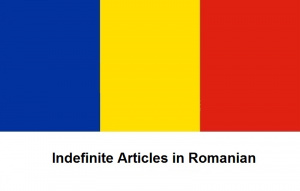Difference between revisions of "Language/Romanian/Grammar/Indefinite-Articles-in-Romanian"
Jump to navigation
Jump to search
(Indefinite Articles in Romanian) |
m (Quick edit) |
||
| (2 intermediate revisions by 2 users not shown) | |||
| Line 1: | Line 1: | ||
[[File:Indefinite Articles in Romanian.jpg|alt=Indefinite Articles in Romanian|thumb|Indefinite Articles in Romanian]] | [[File:Indefinite Articles in Romanian.jpg|alt=Indefinite Articles in Romanian|thumb|Indefinite Articles in Romanian]] | ||
Hello everybody, | Hello everybody, | ||
In today's lesson you will | In today's lesson you will learn how to use '''INDEFINITE ARTICLES''' in Romanian. | ||
In Romanian the indefinite article is placed at the beginning of the noun. | |||
<span link>Don't hesitate to look into these other pages after completing this lesson:</span> [[Language/Romanian/Grammar/Cases|Cases]], [[Language/Romanian/Grammar/Conditional-Mood|Conditional Mood]], [[Language/Romanian/Grammar/How-to-use-the-Modal-Verb-“Must”-in-Romanian|How to use the Modal Verb “Must” in Romanian]] & [[Language/Romanian/Grammar/The-Accusative-Case-in-Romanian|The Accusative Case in Romanian]]. | |||
== Regarding masculine and neuter: == | |||
Un (nominative/accusative) and unui (genitive/dative): | |||
* "Friend" / prieten and "a child" is un prieten | |||
* "Place" / loc and "a place" is un loc | |||
== Regarding feminine: == | |||
O (nominative/accusative) and unei (genitive/dative): | |||
* "Bottle" / sticlă and "a bottle" o sticlă | |||
* "Emergency" / urgenţe and "an emergency" / unei urgenţe | |||
==Other Lessons== | |||
* [[Language/Romanian/Grammar/Inclusive-Case-in-Romanian|Inclusive Case in Romanian]] | |||
* [[Language/Romanian/Grammar/How-to-Use-Be|How to Use Be]] | |||
* [[Language/Romanian/Grammar/Useful-Verbs|Useful Verbs]] | |||
* [[Language/Romanian/Grammar/Possessive-Case-in-Romanian|Possessive Case in Romanian]] | |||
* [[Language/Romanian/Grammar/Gender|Gender]] | |||
* [[Language/Romanian/Grammar/Nouns|Nouns]] | |||
* [[Language/Romanian/Grammar/Plural-in-Romanian|Plural in Romanian]] | |||
* [[Language/Romanian/Grammar/Ordinal-Numbers-in-Romanian|Ordinal Numbers in Romanian]] | |||
* [[Language/Romanian/Grammar/Adjectives|Adjectives]] | |||
* [[Language/Romanian/Grammar/Prepositions|Prepositions]] | |||
<span links></span> | |||
| | |||
| | |||
| | |||
| | |||
| | |||
| | |||
| | |||
| | |||
| | |||
| | |||
Latest revision as of 23:19, 26 March 2023
Hello everybody,
In today's lesson you will learn how to use INDEFINITE ARTICLES in Romanian.
In Romanian the indefinite article is placed at the beginning of the noun.
Don't hesitate to look into these other pages after completing this lesson: Cases, Conditional Mood, How to use the Modal Verb “Must” in Romanian & The Accusative Case in Romanian.
Regarding masculine and neuter:[edit | edit source]
Un (nominative/accusative) and unui (genitive/dative):
- "Friend" / prieten and "a child" is un prieten
- "Place" / loc and "a place" is un loc
Regarding feminine:[edit | edit source]
O (nominative/accusative) and unei (genitive/dative):
- "Bottle" / sticlă and "a bottle" o sticlă
- "Emergency" / urgenţe and "an emergency" / unei urgenţe
Other Lessons[edit | edit source]
- Inclusive Case in Romanian
- How to Use Be
- Useful Verbs
- Possessive Case in Romanian
- Gender
- Nouns
- Plural in Romanian
- Ordinal Numbers in Romanian
- Adjectives
- Prepositions
